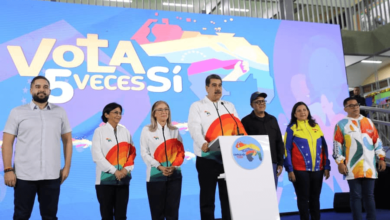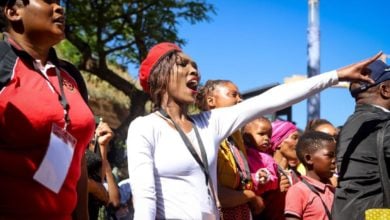Government leaders of the Bolivarian Republic of Venezuela have announced that President Hugo Chávez will not return to Caracas Jan. 10 for his formal inauguration before the National Assembly, as provided for in Article 231 of the Bolivarian Constitution.
But contrary to the right wing’s demands that Chávez must forfeit his fourth term as president for not appearing on Jan. 10, his government leaders point out that the same article 231 provides: “If for any reason the President of the Republic cannot take office before the National Assembly, he or she will do so before the Supreme Court.”
There is no date indicated for the alternate swearing-in option. Thus, Venezuela’s attorney general Luisa Ortega Díaz said on Tuesday, Chávez was re-elected, his cabinet remains the same, there is no power void, and he can take the oath at a later date.
Yesterday, the Venezuelan Supreme Court ruled that Chávez can postpone his inauguration for an indeterminate time.
Mass rallies to support Chávez and stand up for the Bolivarian Revolution will take place across Venezuela. In rallies and popular forums in these days, the people are shouting, “We are Chávez!”
Of course, everyone knows the oath is not the real issue.
It is the ongoing power struggle between the wealthy elites who ruled unchallenged in Venezuela for decades and the vast majority of Venezuelans who will no longer accept going back to a life of poverty, repression and submission.
This latest ploy by the opposition is a spurious attempt by the right wing to derail the Bolivarian Revolution and the continued progress demanded by the people.
Chávez was re-elected president on Oct. 7 with a strong majority of 55 percent, 2 million more votes than his opponent. That election was followed by a sweeping Dec. 16 gubernatorial victory in 20 of 23 states for Chávez’s United Socialist Party of Venezuela.
The National Assembly — elected in 2010 — is majority PSUV with 98 delegates. The right-wing MUD coalition has 65 seats and the PPT, Homeland for All, has two delegates.
The overwhelming support for the revolutionary struggle in Venezuela, launched by Chávez in 1992 when he led a section of the military in an uprising against right-wing President Carlos Andrés Pérez, is evident in all government institutions. The masses’ backing is the result of 13 years of radical economic changes, from a new Constitution to an open push toward socialism. Venezuela’s huge oil and gas reserves, once the source of unlimited profits for foreign oil and the country’s capitalists, is now tapped for housing, education, healthcare and other social development.
Chávez’s serious bout of recurrent cancer has sharpened the class struggle, with the right-wing opposition — the powerful Venezuelan bourgeoisie and U.S. imperialism — trying to use his health crisis to destabilize the country and return to their former unchallenged status.
But Venezuela’s poor and working people are determined to continue fighting for a better future.
A united front
The Venezuelan and U.S. capitalist media are fueling rumors, claiming divisions within the Bolivarian government forces. In a truly desperate move, they are demanding that instead of Nicolás Maduro, whom Chávez personally named as his preferred successor, that Diosdado Cabello assume the presidency if Chávez were to become incapacitated.
Curiously, the opposition also dislikes the pro-Chávez Cabello, which shows how weak the right wing’s position is.
Instead of divisions, the unity among leaders and the masses is getting stronger.
Cabello, a longtime military officer close to Chávez, and Maduro, executive vice-president and longtime socialist backer of Chávez, appeared in public together with other government leaders.
And yet, Chávez obviously had to consider a successor if he were not able to continue.
In early December, when Chávez announced he would return to Cuba for emergency surgery, he said that in the event he could not complete his presidency, “if you have to vote in a new election, you should vote for Nicolás Maduro.”
Maduro, 50, has a long history in socialist activism. In the 1970s and 1980s he led co-workers as a Metro bus driver in the capital of Caracas. Although unions were not allowed in that job, he still acted on their behalf.
Recognizing early Chávez’s importance after his audacious attack against dictator Pérez in 1992, Maduro actively organized for Chávez’s freedom from prison. He has been with Chávez since then.
Days after he was elected president, Chávez named Maduro as executive vice-president. Maduro is also foreign minister.
Diosdado Cabello comes from the military and defended Chávez when the right wing used sections of the military to try to overthrow him in 2002.
On Jan. 5, Diosdado Cabello was elected for the second time as president of the parliamentary body. In the debates leading up to the election, opposition delegates called for a sharing of leadership positions within Parliament. Cabello and the PSUV delegates roundly declared no, saying the right would attempt a coup.
Today, in a symbolic inauguration celebration, Latin American government leaders are coming to Venezuela to join rallies and affirm their support for the Bolivarian revolution. Cuba, Nicaragua, Ecuador, Argentina and other countries are sending representatives.
In an exciting display of support for Chávez, Cabello called for the people to bring their “sashes” on Jan. 10 to the rallies, referring to the ceremonial tri-color sash that a new president dons in Venezuela.
He said: “Anyone who has a sash, bring it along, because tomorrow the people will be invested as president of the republic, because the people are Chávez. All of us here are Chávez, the people in the street are Chávez, the lady who cooks is Chávez, the comrade who works as a watchman is Chávez, the soldier is Chávez, the woman is Chávez, the farmer is Chávez, the worker is Chávez; we’re all Chávez.”






